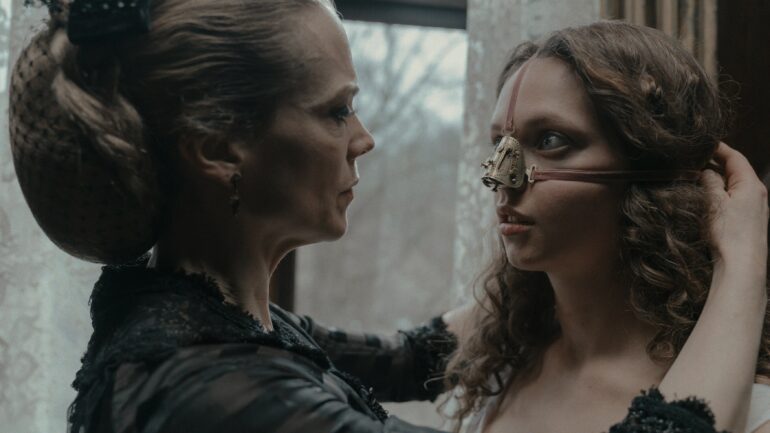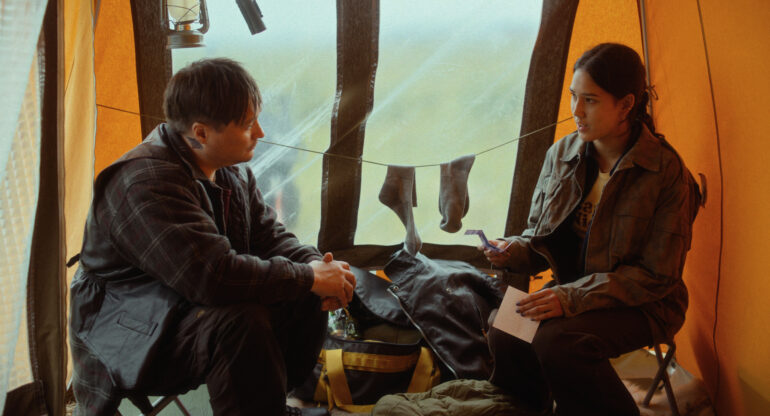Written by: Jan Lumholdt
10.02.25
Debut features, completed trilogies, artful installations, feminist icons, and journeys to Greenland, Gaza and Galicia – it’s all found in the ten Nordic entries at the 75th Berlinale.
Playing February 13-23, 2025, the Berlin International Film Festival, aka the Berlinale, will celebrate its 75th edition this year. Through eight eventful and at times turbulent decades, a strong Nordic participation has been seen from the very start, with a spread of memorable entries through the years, conquering an array of awards and accolades along the way, including three Golden Bears for best film.
This year, ten Nordic titles have been selected, spanning from fiction features and series to documentaries and the art installation field, and involving a variety of creative talent.
First and foremost, there’s the third and final chapter from Norwegian director Dag Johan Haugerud and producer Motlys in the "Sex, Dreams and Love" trilogy (2024), the second to screen in Berlin – Sex was entered here last year, while Love (Kjærlighet) played Venice. Dreams (Drømmer) centres on a 17-year female and her infatuation with her French teacher. Ella Øverbye and Selome Emnetu star. Dreams, sold by m-appeal, is the sole Nordic production in the main competition.
The Panorama section offers four entries with Nordic involvement; three fiction features and one documentary. Denmark’s Home Sweet Home (Hjem kære hjem) marks the completion of yet another trilogy, Frelle Petersen’s portrayal of his native Sønderjylland region, starting with Uncle (Onkel, 2019) and continuing with Forever (Resten af livet, 2022). Home Sweet Home once again stars Jette Søndergaard, who has played the lead in all three films, as Sofie, who is torn between her work as a caretaker for old people and being a single mother of a young daughter. Production is by Zentropa with sales by Trust Nordisk.
Beginnings (Begyndelser) marks director Jeanette Nordahl’s second feature, and second Berlin entry. David Dencik and Trine Dyrholm star as a couple whose impending divorce is cut short when one of the spouses suffers a stroke. The production is a collaboration between Snowglobe, Denmark, Hobab, Sweden, and Lemming Film, Belgium, with sales by REinvent International.
A big Berlin hit, the very first edition in 1951, when West and East Berliners gathered around the Potzdamer Platz border zone to watch free outdoor screenings of the 1950 Disney version of Cinderella, is given a very different gaze 75 years later, courtesy of Norwegian Emilie Blichfeldt. Already gaining notice for her short films, focusing on body and beauty image, she takes the same themes a bit further in her debut feature The Ugly Stepsister (Den stygge stesøsteren), an excessive exercise in body horror, it is promised/warned. The main producer is Mer Film, Norway, with co-production by Zentropa Sweden, Motor Productions, Denmark, and Lava Films, Poland. Sales are handled by Memento International. The film is supported by Nordisk Film & TV Fond (NFTVF), as are Haugerud’s and Nordahls’s films.
Other People’s Money (Die Affäre Cum-Ex) is a German-Danish series from producers X Filme Creative Pool and True Content Entertainment, with co-production by Austria’s EPO-Film. Dividend taxes, if handled a certain way, can be refunded twice, some clever minds have calculated, which sets off a multi-billion fraud scheme with a subsequent investigation known as “The CumEx-Files”. It all took place across Europe in the 2010s, with Germany and Denmark playing central parts. The series is co-directed by German Dustin Loose and Dane Kaspar Munk, with an international cast, including Karen-Lise Mynster, Thomas Hwan and David Dencik in principal roles. Beta Film handles world sales.
The documentary feature Yalla Parkour is another debut, directed by Palestinian-born Areeb Zuaiter, who brings a curious account of a group of young parkour athletes nimbly practising their acrobatic movements across war-torn Gaza. The main producer of this international co-production is Kinana Films, Sweden.
Berlin’s ambitious youth and children’s segment has had a regular and often highly appreciated Nordic participation ever since 1978, when the Kinderfilmfest (renamed Generation in 2007) was introduced, a warm and vital relationship through the years. The 2025 Generation section presents two Nordic entries, taking place is Galicia and in Greenland, both with Danish involvement. Only on Earth is the second documentary feature from artist-filmmaker Robin Petré, who explores the interaction between humans, animals and nature in Southern Galicia in Spain, where wild horses have helped prevent fires in this dry land by curbing flammable undergrowth. These days, their number is steadily declining, and the natural balance risks being disrupted. Denmark’s Hansen & Pedersen is the main producer, Polar Star Film in Spain co-produces, with world sales by Autlook Filmsales. The documentary is supported by NFTVF.
Also in Generation is Christoffer Rizvanovic Stenbakken’s The Thief (Anngeerdardardor), a visit to the town of Tasiilaq in East Greenland, where the locals helped create this story, concerning a missing sled dog that turns out to be stolen. Frau Film is the main producer of this pioneer work, the first ever film to be shot in this region, with co-production by Piteraq Pictures and sales by Gargantua Film Distribution.
The experiment-prone Forum section will screen beneath the placid lake, a projection-based co-creation by Indian director Kush Badhwar and Indian anthropologist Vyjayanthi Rao, produced together with waydk, Finland. The main theme is a massive dam construction in Telangana in southern India and its aftermath.
The Forum section is also a highly fitting one for Vibeke Løkkeberg, iconic and ever-durable Norwegian filmmaker since the early 1970s, and spanning seven active decades to date. The Long Road to the Director's Chair will world-premiere at the very location where it was shot, in 1973, at the First International Women’s Film Seminar, organised at the Arsenal cinema theatre in Berlin. Løkkeberg attended, and also brought a camera crew to document the event. The footage, presumed lost, but recently rediscovered, constitutes the foundation of this exploration of a piece of unique history, film and otherwise.
Kevlar Soul (Kevlarsjäl), the Swedish drama about a dysfunctional family directed by Maria Eriksson-Hecht and produced by Zentropa Sweden, has been nominated for the Eisvogel – Prize for Sustainable Film Production. The film is recognised for its commitment to sustainability, which influenced every aspect of the production. Kevlar Soul implemented environmental guidelines for crew members regarding efficient logistics, waste management, the use of second-hand materials, carpooling, and electric vehicles. The production also used the "Hållbar film" system to document its sustainable measures.
The Indigenous Cinema Alliance (ICA), which showcases market-ready feature films from Indigenous artists worldwide, will present two Nordic titles. Premiering in Berlin is the Greenlandic film Walls, about two women, a film director and an inmate, who meet by chance in a Greenlandic prison. Walls is directed by Nina Paninnguaq Skydsbjerg and Sofie Rørdam. Additionally, director Egil Pedersen's Sámi feature film from 2024 My Father's Daughter (Biru Unjárga) will also be screened at ICA.
Among the selections for the Berlinale Series Market are two Nordic series: RÚV's drama series Vigdís, directed by Björn Hlynur Haraldsson and Tinna Hrafnsdóttir, and NRK's A Sámi Wedding (Heajastallan), created by Åse Kathrin Vuolab. Both series, and My Father's Daughter, are supported by NFTVF.
For more information about the Berlinale: CLICK HERE.


